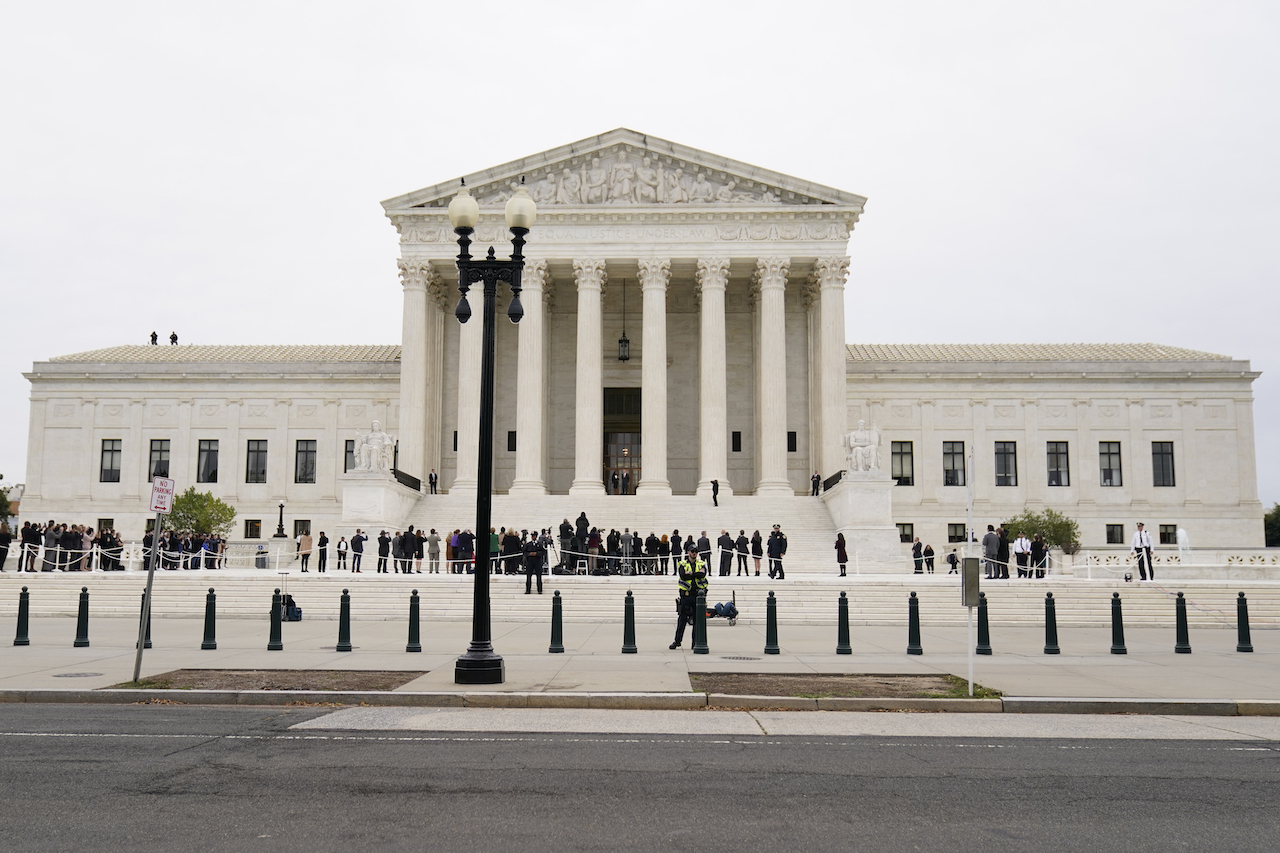America’s most conservative Supreme Court in 90 years is poised to do serious damage to LGBTQ2S+ rights.
The Supreme Court has decided to hear 303 Creative LLC v. Elenis during the 2022–2023 term, the outcome of which could represent a major setback for LGBTQ2S+ equality in the United States. The case involves Lorie Smith, a Christian woman living in Colorado who creates wedding-announcement websites. She wants to put a notice on her page saying that she won’t serve same-sex couples, but the state’s anti-discrimination law would prevent her from doing so.
In 2016, Smith decided to sue Colorado for impinging on her rights to free speech and free exercise of religion. Both a district court and the 10th Circuit Court of Appeals ruled against her in 2019 and 2021, respectively, with the latter arguing that non-discrimination laws are critical to upholding “democratic ideals.”
Oral arguments in 303 Creative LLC have yet to be scheduled, and the Supreme Court will only be hearing Smith’s argument that the government violated her freedom of speech, not the argument that it violated her right to practise her religion. This means that the case won’t necessarily rule on whether people can discriminate against LGBTQ2S+ people for religious reasons—such as in the case of someone like Kim Davis, the Kentucky clerk who refused to sign same-sex couples’ marriage licences.
But the lack of deliberation over Smith’s rights to “religious liberty” doesn’t mean the case won’t have sweeping implications. Although the Supreme Court ruled in 2020 that it’s illegal to fire LGBTQ2S+ people or deny them employment based on their sexual orientation or gender identity, just 23 U.S. states have comprehensive laws on the books banning discrimination in areas like housing, education and healthcare.
“Folks would experience humiliation.”
Should the Supreme Court favour Smith’s argument, Sarah Warbelow, the Human Rights Campaign’s legal director, predicts that the entirety of the U.S. may come to resemble states without non-discrimination laws.
“Folks would experience humiliation,” Warbelow tells Xtra. “They would experience an inability to access the services that they need, particularly in smaller communities. And there are real consequences to discrimination: it contributes to negative mental health, higher rates of obesity, cancer, smoking.”
Warbelow felt that it was important to note, too, that because Smith didn’t actually have to turn away a same-sex couple, it sets up a dynamic where “the only public face” of the case is her own. The plaintiff brought forward the complaint not based on an instance in which she was forced to provide service to a same-sex couple, but based on the idea that she may be compelled to some day in the future.
“We don’t get to hear what it means for a same-sex couple to be denied these services, and how painful that is,” she says. “I would argue that it is likely intentional.”
Warbelow expressed some optimism that the Supreme Court would uphold Colorado’s laws, pointing out that the U.S. has a long history of supporting anti-discrmination codes. In the 1968 case Newman v. Piggie Park Enterprises, Inc., a segregationist restaurant owner claimed the Civil Rights Act of 1964 violated his religious beliefs and refused to allow Black people to eat in his restaurants. The Supreme Court unanimously rejected his claim.
The Supreme Court’s decision in 303 Creative LLC could answer some of the broader questions regarding free speech and LGBTQ2S+ rights left unresolved by its 2018 ruling in Masterpiece Cakeshop Ltd. v. Colorado Civil Rights Commission. Similar to Piggie Park, the case centred on a Christian bakery owner, Jack Phillips, who refused to make a wedding cake for a gay couple. (The Alliance Defending Freedom, the right-wing Christian legal outfit backing Smith’s case, also represented Phillips in his arguments before the Supreme Court.)
The court ultimately sided with the baker in a 7-2 verdict, without addressing whether opponents of LGBTQ2S+ equality as a whole could be permitted an exemption to non-discrimination laws.
Warbelow noted, however, the conservatism of the Supreme Court and its hostility to LGBTQ2S+ people. For instance, the Supreme Court ruled in June 2021 that Philadelphia discriminated against religious adoption and foster-care agencies by denying them city contracts if they refused to place children in same-sex households.
“The court demonstrated that it’s much more hostile to LGBTQ2S+ people and their rights, and it has consistently favoured arguments involving religion,” Warbelow says. “The reason we have discrimination laws to begin with is that not everyone was able to avail themselves of the public market. Congress knew when it passed the Civil Rights Act of 1964. It’s why the state of Colorado passed its law prohibiting discrimination based on sexual orientation and gender identity.”
Despite the Supreme Court’s foreboding 6-3 tilt to the right, Warbelow believes the end result of 303 Creative LLC is far from certain. “I think everyone is very much in a wait-and-see posture,” she says, “even though there are concerns based on the decisions of the court.”


 Why you can trust Xtra
Why you can trust Xtra


